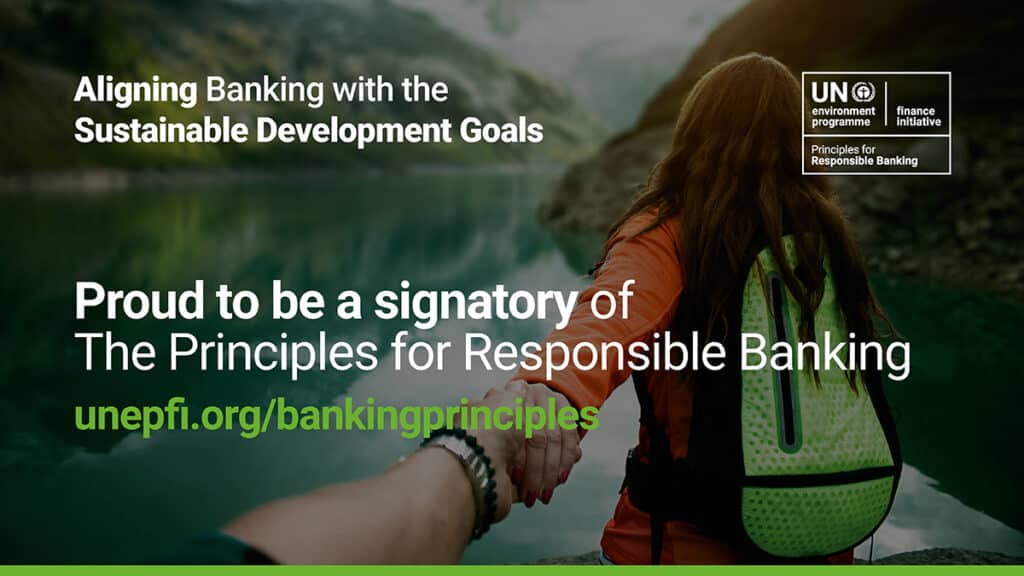Our commitment is our adherence to the UN’s Principles of Responsible Banking, a unique framework for sustainable banking developed through a collaboration between banks worldwide and the United Nations Environment Programme Finance Initiative, says Annita Pavlou
Practically, how do you integrate ESG principles into your bank’s core strategies and operations?
The integration of ESG principles into our operations is multifaceted and deeply embedded in our strategic framework. A standout example of our commitment is our adherence to the UN’s Principles of Responsible Banking, a unique framework for sustainable banking developed through a collaboration between banks worldwide and the United Nations Environment Programme Finance Initiative (UNEP FI).
It aligns the operational and strategic facets of banks with the broader vision articulated by society, encapsulated in the UN Sustainable Development Goals and the Paris Climate Agreement. By becoming signatories, we join the largest global banking community committed to sustainable finance, engaging in the exchange of best practices and collaborative development of innovative tools and guidance for the benefit of the banking industry at large.
Signatory banks essentially commit to adopting the six Principles of Responsible Banking:
- Alignment
- Impact & Target setting
- Clients & Customers
- Stakeholders
- Governance and Culture
- Transparency and Accountability
In practice, signatories commit to align their business strategy with individual needs and society’s goals as these are expressed in the UN Sustainable Development Goals, the Paris Climate Agreement, and relevant national and regional frameworks, to enhance their positive impact on people and the environment by limiting any adverse consequences from their operations, to work responsibly with their clients to encourage sustainable practices, to consult and partner with stakeholders to achieve society’s goals, to implement their commitment to the principles through effective corporate governance and a culture of responsible banking, and to be accountable and transparent in disclosing their progress in implementing these principles and their impact on the bank.
How do you engage with stakeholders (e.g., investors, customers, employees) on ESG issues? Are they concerned about these issues?
Engagement with stakeholders on ESG issues is a critical component of our operational ethos. Our investors, clients, and employees are increasingly attuned to the importance of ESG considerations, each viewing them through the lens of their specific interests and concerns. This collective awareness underscores the universal significance of embedding ESG criteria into our business practices to ensure a sustainable future for all parties involved.
Our response to the growing demand from investors and shareholders for robust ESG practices is proactive and comprehensive. We offer support to our clients through environmentally friendly products and services, encouraging sustainable practices that contribute to economic activities capable of generating shared prosperity for both current and future generations. This responsible engagement with clients and stakeholders is part of our broader commitment to societal goals, including effective governance and a culture of responsible banking. Regular reviews of our adherence to these principles ensure that we remain transparent and accountable, both in terms of our positive impacts and our efforts to mitigate adverse effects.
Moreover, our initiatives extend beyond mere compliance with ESG principles. We actively assess our impact on the environment and society, setting ambitious goals in areas where we can make the most significant difference and openly disclosing our progress. Our commitment also involves a systematic approach to risk assessment and opportunity identification in the transition to a more sustainable economy. For example, our new lending strategies now prioritise financing for energy-efficient residential properties, in line with the Green Loan Principles (GLP) of the Loan Market Association (LMA). This approach not only supports the decarbonisation targets but also enriches our engagement with stakeholders, enhancing our contributions to societal well-being in key areas such as healthcare, education, and environmental sustainability.
In addition, our contribution to society is constantly expanding in a meaningful manner, particularly in the areas of healthcare, education and the environment. An example of the above are the recent educational programmes concerning financial literacy, which are offered to the public and will be extended to schools. We want to help people learn basic financial concepts and familiarise themselves with modern methods of conducting banking. With regards to our people, we continue to offer learning and development opportunities, capitalising on the latest training methods. We also offer wellness programmes aiming to enhance mental, physical, financial and social health.

Our approach to assessing the environmental and social impacts of our actions and lending decisions is both strategic and targeted. Throughout 2023, we embarked on several key initiatives, including the following:
- Set decarbonisation targets on Scope 1 and Scope 2 greenhouse has (GHG) emissions of the Group
- Set decarbonisation tarqets on Mortgage portfolio
- Designed the strategy to meet the decarbonisation targets set
- Estimated the Scope 3 GHG emissions of loan, investment and insurance portfolio (based on methodology availability) by applying PCAF standard and proxies
- Published the first TCFD report, Pillar 3 disclosures on ESG risks and the sixth Sustainability report
- Established a structured and detailed Business Environment Scan process on C&E risks
- Launched ESG questionnaires in the loan origination
- Restricted lending and investment in specific carbon-intensive sectors
- Set Green new lending targets
- Developed a Sustainable Finance Framework
- Launched a Green Housing product by applying the GLPs of LMA
- Established thorough sustainability Governance arrangements
- Performed Board of Directors, Senior Management and Control functions ESG trainings
For 2024 we are already implementing equally significant priorities. These priorities are directly related with our most important stakeholders; our clients, our regulators, our investors, our people.
Looking ahead, what do you perceive as the most significant ESG challenges and opportunities for the Bank of Cyprus over the next five-ten years?
As we navigate the path toward sustainable transformation, we recognise both the immense responsibilities and opportunities that lie ahead. Our proactive stance and leadership in the sector have positioned us at the forefront of the sustainable transformation, not just within the financial industry but across the entire Cypriot economy.
Our goals for the coming decade are bold yet achievable: achieving Carbon Neutrality by 2030, reaching Net Zero emissions by 2050, and consistently increasing our Green Asset and Mortgage Ratios. These ambitious targets reflect our dedication to exceeding expectations and our commitment to making a positive impact on our planet, society, and the individuals within it. Our actions and achievements to date, validated by independent rating agencies, demonstrate our capability and resolve to lead by example in the sustainable transformation journey.
Finally, how does your bank ensure compliance with national and international ESG-related regulations?
Our approach to regulatory compliance transcends mere adherence to existing standards. We strive to lead by example, often achieving regulatory milestones well ahead of prescribed deadlines. A testament to this proactive approach is our early achievement of gender diversity targets within our executive ranks, a goal that was set for 2030 but accomplished much sooner with the appointment of new female General Managers. This achievement demonstrates our commitment to equal opportunities, an inclusive culture but and our broader governance policies designed to sustain stakeholder confidence and create shareholder value.
Furthermore, we are intensifying our efforts to be compliant with the new Corporate Sustainability Reporting Directive (effective for FY2024) which modernises and strengthens the rules concerning the environmental, social and governance information that we have to report. The CSRD aims to ensure that investors and other stakeholders have access to the information they need to assess the impact of companies on people and the environment and for investors to assess financial risks and opportunities arising from climate change and other sustainability issues. Simultaneously, we aim to be aligned with ECB’s expectations defined by ECB’s Guide on Climate related and Environmental risks and EU Taxonomy.







Click here to change your cookie preferences